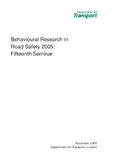JavaScript is disabled for your browser. Some features of this site may not work without it.
| dc.contributor.author | Dorn, Lisa | |
| dc.contributor.author | Muncie, Helen | |
| dc.date.accessioned | 2020-02-25T11:24:35Z | |
| dc.date.available | 2020-02-25T11:24:35Z | |
| dc.date.issued | 2005-11-30 | |
| dc.identifier.citation | Dorn L, Muncie H. (2005) Work related road safety: Age, length of service and changes on crash risk. In: Behavioural Research in Road Safety 2005: Fifteenth Seminar, London, November 2005 | en_UK |
| dc.identifier.isbn | 1 90476361 8 | |
| dc.identifier.uri | https://www.gov.uk/government/uploads/system/uploads/attachment_data/file/501151/list-of-road-safety-reports.csv/preview | |
| dc.identifier.uri | https://dspace.lib.cranfield.ac.uk/handle/1826/15181 | |
| dc.description.abstract | Age and experience are known to be major factors in road traffic collisions (Maycock et al., 1996) and are commonly used as predictors of crash frequency (Evans and Courtney, 1985). But age and experience are difficult to separate when investigating crash risk (Brown, 1982; Ryan et al., 1998; Mayhew and Simpson, 1990; Bierness, 1996). Experience is closely related to age but independently influences crash risk. For age, mileage-adjusted crash risk declines with age but then rises for drivers over 65 (Maycock et al., 1991). This is thought to be due to physical and cognitive declines in older people and to increased risk-taking in younger drivers (Chipman et al., 1992; Clarke et al., 1998; McGwin and Brown, 1999). For experience, even limited driving experience has a major effect on road safety. For example, there is a disproportionately higher crash rate during the first year of driving, particularly in the first few months after licensure (Sagberg, 1998). For age and experience, Mayhew et al. (2003) found larger decreases in crash risk amongst younger novices compared with older novices during the first few months of driving. This was interpreted as due to greater initial risk-taking amongst younger novices, with on-road driving experience facilitating a more rapid learning rate compared with older novices. They suggest that this was an appropriate point at which to provide training intervention. There is reasonable literature on the effects of age and experience on accident involvement, but little is known about whether these effects can be generalised to professional drivers, especially since professional drivers differ substantially from the general population of drivers. | en_UK |
| dc.language.iso | en | en_UK |
| dc.publisher | Department for Transport: London | en_UK |
| dc.rights | Attribution-NonCommercial 4.0 International | * |
| dc.rights.uri | http://creativecommons.org/licenses/by-nc/4.0/ | * |
| dc.title | Work related road safety: Age, length of service and changes on crash risk | en_UK |
| dc.type | Conference paper | en_UK |
Files in this item
The following license files are associated with this item:
This item appears in the following Collection(s)
-
Staff publications (SATM) [4360]

